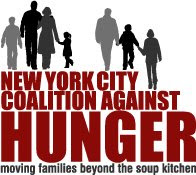A powerful new report released last week by the Comptroller's office provided further evidence of serious flaws in welfare reform and job training in NYC. The report details many inadequacies in the more than $44 million spent each year on contracts for employment services and placement efforts for New Yorkers leaving welfare.
1) As explained on page 19 of the report, City contracts provide bonuses to contractors for placing people in "high wage" jobs, defined as jobs that pay a weekly wage of $344.25. Equaling only $17,091 per year, such "high wage" jobs would relegate most New Yorkers to an insecure financial existence, and actually place families of four or more below the federal poverty line.
2) To make matters even worse, the City gives these "high wage" bonuses to contractors even when wages are far below this level. Out of three such bonus payments found from of a random sample, one job paid a weekly wage of $150 (equaling $7,000 for a year) and one paid a weekly wage of $193 (equaling $10,036 for a year). Imagine that - New York tax dollars being used to reward contractors for providing jobs that pay less than half the poverty line for a family of three!
Note that even in times of high unemployment following the 2001 recession and 9/11, the City's welfare rolls were not allowed to grow to meet the extra, urgent need. And in recent years, the City's job placement rates fell sharply even as welfare rolls continued to decline. Even though the official unemployment rate is lower today, the City has again lowered its job placement targets to only 80,000 people for 2007 in an effort to "move the goalposts" based on prior failures. As of May 20, 2007, the City had only placed 24,216 people in jobs - 30% of its target for the year.
The City has explained that these reduced job placement rates are a function of the fact that the people remaining on the welfare rolls tend to have more barriers to employment. That is certainly true. But it doesn't explain why the welfare rolls are continuing to decrease at a time when job placements are also decreasing.
It is more than fair to ask whether such continued reductions in the public assistance rolls are responsible, at least in part, for the growing poverty, hunger, homelessness, and inequality of wealth in New York City.
Providing news and commentary on issues facing the City's anti-hunger community

The New York City Coalition Against Hunger represents New York City’s over 1,200 soup kitchens and food pantries and the 1.3 million low income New Yorkers who are forced to use them. The Coalition works to meet the immediate food needs of low-income New Yorkers and enact innovative solutions to help them move “beyond the soup kitchen” to self-sufficiency.
Blog Archive
-
▼
2007
(102)
-
▼
June
(10)
- City Report Exposes Serious Flaws in Welfare Reform
- Details of Poverty Payments Announced
- The Rich Get Richer While...
- Nutritional Labeling Rule Challenged
- NY Post to Hungry People: You're Mentally Ill
- Colbert Highlights Food Stamp Challenge
- What Does Hunger Cost?
- Spitzer Eases Food Stamps Access for Working Families
- Study: Hunger Costs New York City $2.65 Billion Ye...
- Upstate Advocates Applaud State Assembly for Passi...
-
▼
June
(10)
No comments:
Post a Comment